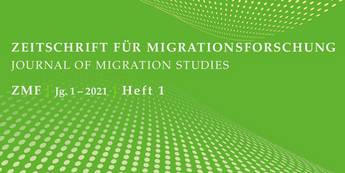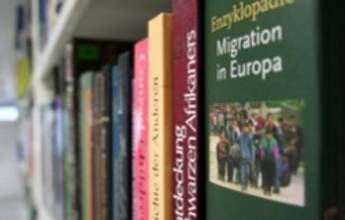Weiterführende Informationen
Top content
News

›The Jet Age in Eight Passengers: Learning to Use the Infrastructures of International Aviation‹
[22.4.2025] IMIS/SFB Lecture with Prof. Dr. Lauren Stokes on 29 April 2025 18:00-19:30h in Room 15/318 (Seminarstraße 20) or via Livestream. Lauren Stokes is Associate Professor at the Northwestern University and Research Fellow at HIAS – Hamburg Institute for Advanced Study. She is a historian of modern Germany, with a particular focus on migration and race in German and European history. In her talk, she provides an insight into the social history of the 'jet age' since the 1960s and analyses airports and aviation as key sites for our age of unequal mobility, marked by differences of class, race and nationality.
Colloquium in Forced Migration and Refugee Research
[9.4.2025] The Collaborative Research Centre SFB 1604 “Production of Migration” and the BMBF-funded project “Forced Migration and Refugee Studies: Networking and Knowledge Transfer” (FFVT) offer a fully funded two-day colloquium in the field of forced migration and refugee research. It is open to PhD researchers and early career post-docs based in Germany.
Applications should consist of an abstract of the PhD or Postdoc project (ca. 500 words) including a section on the aspect or chapter to be presented, a brief letter of motivation (ca. 250 words) and short bio (ca. 100 words).

IMIS/SFB Lecture Series: Programme Summer Semester 2025
[31.1.2025] IMIS and SFB 1604 invite you to a joint lecture series: We are looking forward to inspiring lectures with guests from the fields of anthropology, history, cultural studies, sociolinguistics, law, political science and sociology. Read more
Journal of Migration Studies: issue 1/2024 online now
[26.11.2024] Vol. 1/2024 of the Journal of Migration Studies (ZMF) is online now: It comprises four essays and two discussion papers from different disciplines. The new journal is a freely accessible open access journal and is published twice a year. All contributions are subject to a review process for quality assurance. The journal offers a forum for the scolarly examination of the background and conditions of spatial movements of people in the past and present as well as of social change induced by migration processes in contexts of origin, transit and destination. Read more
Journal of Migration Studies (ZMF): Call for Special Issues
[15.11.2024] The Journal of Migration Studies (Zeitschrift für Migrationsforschung, ZMF) is a peer-reviewed open access journal in English and German language, published twice a year by the Institute for Migration Research and Intercultural Studies (IMIS) at Osnabrück University. It offers a forum for the scholarly examination of the background and conditions of spatial movements of people in the past and present as well as of social change induced by migration processes in contexts of origin, transit, and destination. Contributions present new findings from various disciplines and fields of research, discuss concepts or formulate theoretical proposals.
We invite scholars in migration research to submit proposals for special issues (6-9 contributions) or special thematic sections in a regular issue (3-5 contributions). Proposals can be submitted at any time, without a specific deadline. Call for Special Issues / ZMF website

International conference and inauguration of the Collaborative Research Centre SFB 1604
[17.7.2024] The international conference ›Production of Migration: Figures, Infrastructures and Spaces‹ and inauguration of the Collaborative Research Centre SFB 1604 took place from 23-25 October at Osnabrück University. More information and programme, Statements & Interviews

Germany's first collaborative research center on migration launches
[10.5.2024] What is migration? The new Collaborative Research Center (Sonderforschungsbereich - SFB) "Production of Migration" at Osnabrück University is investigating this question, because the answer to this question is anything but simple: Why, for example, is the Swedish woman living in Germany not referred to as a migrant, but the children and grandchildren of Turkish immigrants born in Germany are? What is the difference between migration and mobility? How and why do terms for immigrants and their descendants change? In the coming years, the SFB will address such questions. eit. Press release / more information on the SFB

New joint project "Futures of Migration"
[3.5.2024] Another success for migration research in Lower Saxony: The University of Osnabrück, under the leadership of IMIS and with the participation of the Universities of Göttingen and Hildesheim, the Leibniz Institute for Educational Media/Georg Eckert Institute and the Friedland Museum, has successfully applied for the new Lower Saxony cooperation format of a Wissenschaftsraum (Science Space) "Futures of Migration" (FuturMig). - What do migration-related future scenarios look like? What social progress and what fears are associated with migration? What ideas are there for shaping the migration society in a solidary and sustainable way? These are questions that the participating academics will address. They will be focussing on the production of "migration futures" in educational contexts.- The project will be funded with almost three million euros over the next five years. With the "Science Spaces" funding programme, the state of Lower Saxony and the Volkswagen Foundation are supporting cooperation between universities in Lower Saxony and non-university research institutions. 16 projects have received funding approval.
More information: Press release, Niedersächsisches Ministerium für Wissenschaft und Kultur / Press release, Osnabrück University











